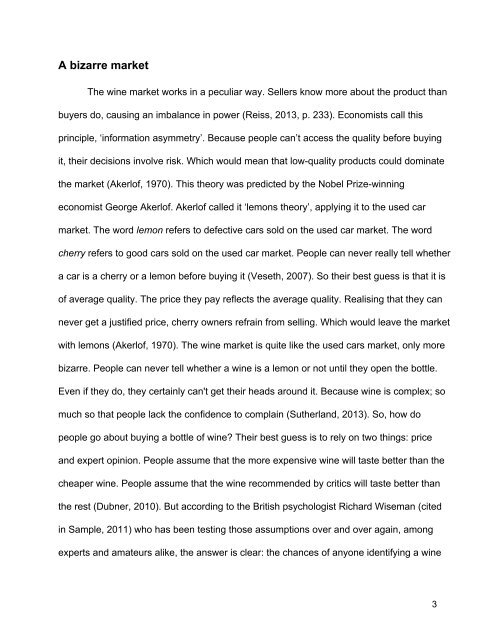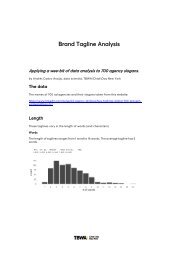The wine delusion
Create successful ePaper yourself
Turn your PDF publications into a flip-book with our unique Google optimized e-Paper software.
A bizarre market<br />
<strong>The</strong> <strong>wine</strong> market works in a peculiar way. Sellers know more about the product than<br />
buyers do, causing an imbalance in power (Reiss, 2013, p. 233). Economists call this<br />
principle, ‘information asymmetry’. Because people can’t access the quality before buying<br />
it, their decisions involve risk. Which would mean that lowquality products could dominate<br />
the market (Akerlof, 1970). This theory was predicted by the Nobel Prizewinning<br />
economist George Akerlof. Akerlof called it ‘lemons theory’, applying it to the used car<br />
market. <strong>The</strong> word lemon refers to defective cars sold on the used car market. <strong>The</strong> word<br />
cherry refers to good cars sold on the used car market. People can never really tell whether<br />
a car is a cherry or a lemon before buying it (Veseth, 2007). So their best guess is that it is<br />
of average quality. <strong>The</strong> price they pay reflects the average quality. Realising that they can<br />
never get a justified price, cherry owners refrain from selling. Which would leave the market<br />
with lemons (Akerlof, 1970). <strong>The</strong> <strong>wine</strong> market is quite like the used cars market, only more<br />
bizarre. People can never tell whether a <strong>wine</strong> is a lemon or not until they open the bottle.<br />
Even if they do, they certainly can't get their heads around it. Because <strong>wine</strong> is complex; so<br />
much so that people lack the confidence to complain (Sutherland, 2013). So, how do<br />
people go about buying a bottle of <strong>wine</strong>? <strong>The</strong>ir best guess is to rely on two things: price<br />
and expert opinion. People assume that the more expensive <strong>wine</strong> will taste better than the<br />
cheaper <strong>wine</strong>. People assume that the <strong>wine</strong> recommended by critics will taste better than<br />
the rest (Dubner, 2010). But according to the British psychologist Richard Wiseman (cited<br />
in Sample, 2011) who has been testing those assumptions over and over again, among<br />
experts and amateurs alike, the answer is clear: the chances of anyone identifying a <strong>wine</strong><br />
3




